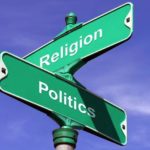
And then there were five — five Catholics left on the Supreme Court after the death of Justice Antonin Scalia on Feb. 13, 2016. How will the loss of the court’s most conservative voice — a voice that often sprung from Scalia’s Roman Catholicism — affect arguments and decisions on the court’s docket this year? Will the next appointment expand the religious diversity of a court that now includes only Roman Catholic and Jewish justices? One of the reported top candidates, Srikanth Srinivasan, is a Hindu, whose possible appointment would broaden the diversity of the court and take it beyond Judeo-Christian faiths — and into Hinduism and polytheism — for the first time. Does the religion of the next Supreme Court justice matter? Should it?
Background
- Read “What Would Scalia Want in His Successor? A Dissent Offers Clues” by Adam Liptak of The New York Times, Feb. 15, 2016. The takeaway: Scalia suggested an evangelical be considered for the post.
- The Hindu profiled Srikanth Srinivasan, a Hindu and potential Supreme Court nominee, on Feb. 14, 2016.
- The New York Times profiled six potential nominees for Scalia’s post on Feb. 14, 2016.
- Read “What the Death of Antonin Scalia Means for Religious Liberty” by Emma Green writing for The Atlantic, Feb. 14, 2016. The takeaway: Scalia sometimes sacrificed religious liberty to originalism.
- Read “How the politics of the next nomination will play out,” a blog post by Tom Goldstein, founder of SCOTUSblog, writing for SCOTUSblog, Feb. 14, 2016. The takeaway: Goldstein says the most likely nominee will be Attorney General Loretta Lynch.
- Read “How Scalia’s Faith Reshaped the Supreme Court” by Elizabeth Dias writing for Time, Feb. 13, 2016.
- Wikipedia maintains a comprehensive page of the demographics of all Supreme Court Justices, including their religious identification and background.
- The Supreme Court Historical Society is a nonprofit organization that preserves the history of the Supreme Court.
Religious cases in the court this year
The court has several religious and moral issues on its docket in the next few months.
- The Little Sisters of the Poor Home for the Aged v. Burwell — Arguments March 23, 2016. This case will challenge the Obama administration’s way of allowing exemptions for religious nonprofits to opt out of insurance coverage for FDA-approved birth control.
- Whole Woman’s Health v. Hellerstedt — Arguments March 2, 2016. This case considers whether restrictions on abortion access in Texas place an undue burden on women.
- Trinity Lutheran Church of Columbia Inc. v. Pauley — Not yet set for argument. This case asks whether the exclusion of churches from an otherwise neutral and secular aid program violates the Free Exercise and Equal Protection clauses of the First Amendment.
National Sources
-
Susan Low Bloch
Susan Low Bloch is a law professor at Georgetown University. She is an expert in constitutional law, communications law and courts and judges and she teaches a seminar on the Supreme Court.
-
Jesse H. Choper
Jesse H. Choper is emeritus professor of public law at the University of California, Berkeley. He is an expert on church-state issues and U.S. Supreme Court decisions regarding religion. He is the author of Securing Religious Liberty: Principles for Judicial Interpretation of the Religion Clauses. He was a law clerk for Chief Justice Earl Warren.
-
Bryan A. Garner
Bryan A. Garner is the founder and president of LawProse and a professor of law at Southern Methodist University School of Law in Dallas. He has personally interviewed nine Supreme Court Justices on writing and oral advocacy and co-authored two books with Antonin Scalia.
-
James Hitchcock
James Hitchcock is a professor emeritus of history at St. Louis University. He wrote the book The Supreme Court and Religion in American Life, Vol. 2: From “Higher Law” to “Sectarian Scruples.”
-
Paul Horwitz
Paul Horwitz is a professor of law at the University of Alabama in Tuscaloosa, where he specializes in law and religion, constitutional law and the First Amendment. He is the author of The Agnostic Age: Law, Religion and the Constitution and First Amendment Institutions.
-
David T. Pride
David T. Pride is executive director of the Supreme Court Historical Society, a nonprofit founded by Chief Justice Warren Burger in 1974 to preserve the history of the Supreme Court.
-
Neil Siegel
Neil Siegel is a professor of law and political science and co-director of the Program in Public Law at Duke University in Durham, N.C. He is an expert on constitutional law and theory, and the Supreme Court. Much of his recent work has been on the Affordable Care Act. He clerked for Justice Ruth Bader Ginsburg.
-
Laurence H. Tribe
Laurence H. Tribe is the Carl M. Loeb University Professor of Constitutional Law at Harvard University. Tribe’s areas of expertise include abortion and church-state issues. He wrote the book Abortion: The Clash of Absolutes.
